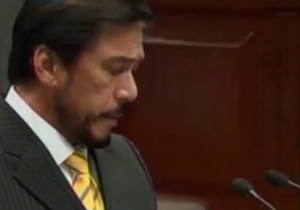Headline
CBCP concerned about drug trade issues in PH
MANILA — The Catholic Bishops’ Conference of the Philippines raised concerns on the proliferation of illegal drug trade in the country.
The bishops discussed the issue in a meeting on Sunday along with issues on K to 12 and the coming general elections.
“It’s not being reported but actually some bishops see that this us really a growing problem,” Mejia said.
He added that what triggered the issue was the conviction of Mary Jane Veloso, a Filipina maid who was spared from death by a firing squad and is waiting for final verdict on her drug trafficking case.
“What actually triggered is what happened to Veloso. She was accused basically of drug trafficking,” Mejia added.
Mejia also said that the bishops are concerned about the spread of drugs in many dioceses adding that they have requested Senate Minority Leader Vicente Sotto III, who used to head the Senate Committee on Dangerous Drugs, to talk about the problem.
PH strategic location
In his speech during the 111th CBCP Plenary Assembly, a copy of which is published in a press release, Sotto noted how the country is vulnerable to illegal drug trafficking.
In terms of geographical location, Sotto said that the country is at “the cross road between the Asian drug-producing and exporting countries and the Pacific drug-dependent countries.”
“It is therefore strategically located making it vulnerable to transnational criminal corporations primarily as a transit point and at the same time a market for drugs.”
He added that the Philippines’ archipelagic condition consisting of many scattered islands and islets makes its coastlines very “expensive to effectively patrol,” rendering it “virtually unguarded” and “making it vulnerable to drug trafficking and smuggling.”
provide effective measure to further ensure the integrity of seized illegal drugs and thereby reducing the incidents of dismissal of drug cases due to technicalities.
By the numbers
Citing the 2014 Annual Report of the Philippine Drug Enforcement Agency (PDEA), Sotto said that shabu and marijuana remain the most abused illegal drugs in the Philippines.
“89% of the year’s arrests are shabu-related; -8.86% covered the confiscation of marijuana; -cocaine, ecstacy, ephedrine, “fly-high” and others constitute the 2.36% of the drug-related arrests.”
He added that in terms of drug trafficking trends, males dominate the number of arrested drug personalities with 11,950 or 87% out of the 13,792 drug personalities.
Of the said total, 60% were arrested for selling or distributing illegal drugs and most of them are withing the age bracket of 30-39.
“Moreover, for 2014, a total of 114 drug dens were dismantled, representing a 37.35% increase in the their number compared to the preceding year’s data,” Sotto said.
Use of minors
This year, a total of 181 minors were rescued in 161 anti-drug operations, according to Sotto. Fifty percent of them were arrested for the possession of illegal drugs and 37% were selling or dispensing illegal drugs.
Sotto said that because the the age of criminal responsibility in the country is at 18 years old and above, “legally-guided drug syndicates use below 18 youth as conduits, sellers and couriers.”
“Thus, our below 18 illegal-drugs offenders continue to inhabit our streets, sidewalks and center islands sniffing their favorite inhalants with their paraphernalia for all the motoring world to see.”
‘Seal cheap, get more buyers’
Sotto noted that the informal settlers have been the common target of drug dealers and their haven are in the settlers’ clusters. This is because of the “difficulty of navigating their alleys.”
“The illegal drugs trade in the Philippines had followed the laws of economics. Sell cheaper and you get more buyers.”
Of the 42,065 barangays in the country, 20.52% are considered drug-affected (mostly in urban areas).
The National Capital Region (NCR) has the highest rate of affectation with 92.10% of the region’s barangays affected, followed by Region 4A or CALABARZON at 33.78%.
Proposed solutions
“But this does not mean that we will give in and just rest our cases,” Sotto said.
To address the alarming issue, the senator is proposing to have a Barangay Anti Drug Abuse Council.
“My thesis, there is a barangay in every island, therefore, a watchdog in each.”
Sotto also cited the recently passed law amending the Comprehensive Dangerous Drugs Act of 2002, particularly the provision relative to the Custody and Disposition of Confiscated, Seized and/or Surrendered Dangerous Drugs, Plant Sources of Dangerous Drugs, Controlled Precursors and Essential Chemicals, Instruments/Paraphernalia and/or Laboratory Equipment.
He said that the law aims to “provide effective measure to further ensure the integrity of seized illegal drugs and thereby reducing the incidents of dismissal of drug cases due to technicalities.”






















